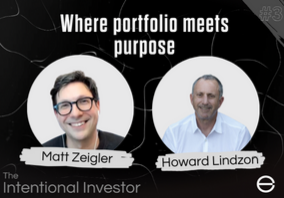A Game of Them
To learn more about Epsilon Theory and be notified when we release new content sign up here. You’ll receive an email every week and your information will never be shared with anyone else.
Continue the discussion at the Epsilon Theory Forum
The Latest From Epsilon Theory
This commentary is being provided to you as general information only and should not be taken as investment advice. The opinions expressed in these materials represent the personal views of the author(s). It is not investment research or a research recommendation, as it does not constitute substantive research or analysis. Any action that you take as a result of information contained in this document is ultimately your responsibility. Epsilon Theory will not accept liability for any loss or damage, including without limitation to any loss of profit, which may arise directly or indirectly from use of or reliance on such information. Consult your investment advisor before making any investment decisions. It must be noted, that no one can accurately predict the future of the market with certainty or guarantee future investment performance. Past performance is not a guarantee of future results.
Statements in this communication are forward-looking statements. The forward-looking statements and other views expressed herein are as of the date of this publication. Actual future results or occurrences may differ significantly from those anticipated in any forward-looking statements, and there is no guarantee that any predictions will come to pass. The views expressed herein are subject to change at any time, due to numerous market and other factors. Epsilon Theory disclaims any obligation to update publicly or revise any forward-looking statements or views expressed herein. This information is neither an offer to sell nor a solicitation of any offer to buy any securities. This commentary has been prepared without regard to the individual financial circumstances and objectives of persons who receive it. Epsilon Theory recommends that investors independently evaluate particular investments and strategies, and encourages investors to seek the advice of a financial advisor. The appropriateness of a particular investment or strategy will depend on an investor’s individual circumstances and objectives.









It seems to me that an individual investor can use “time horizon arbitrage” whilst a professional (who gets measured annually) has a much more difficult time doing it.
Neither is easy as emotions are a part of the human psychological make-up, but pros face career risk to use that long term useful strategy.
BTW, the Federal Reserve (and all the Central Banks) clearly recognized the time-constraint that PM’s face when they designed their market manipulation strategies of QE, Portfolio Theory, communication strategies, etc.
Probably a key factor in how they’ve created their Narrative as such a powerful force in markets.
Perhaps (and hopefully) to their chagrin and doom in coming years as free markets eventually win out.
(Thanks for the quote! Now I understand why NNT blocked me on Tw when I said he was the sillyest.)
Cheers and Happy 2019!
There has to be a middle ground between being a Cynic and a Fool, some way of playing the game without losing one’s soul. Recognizing that all of us human animals, including me and including you, are playing multiple multi-level games … well, that seems like a good start to me. The Truths in life are still death and taxes (and maybe compounding returns). Everything else is theatre, where honesty (with a small h) and truth (with a small t) are probably the best we can achieve. And that’s not so bad. --Ben Hunt
Seeing missionaries on TV doesn’t mean they are an expert but a “Performer” … end-of-story.
Trying my best not to post much until I read the entire archive of Ben and Rusty,up to 2015 on Ben, once finished, I will start with Rusty…Take Care all, always a Skeptic and Optimist!
The OAC photo in the header is a fantastic grab! I didn’t quite get the reference at first You must have spent some effort capturing that look - who is the ridiculous one? Us or them (her) - amazing
Hah - there were a couple to choose from!
You have quite the task ahead of you! The content library is presently the rough equivalent of War and Peace.
I think there’s probably some truth in that. Individual investors really do have a lot of underrated advantages. I still favor a professional adviser for just about everyone, just to help manage behaviors, but point remains.
And I’m not sure one can ever truly know why NNT blocked them. Somehow I’ve managed the block hammer, although Ben has been in the penalty box for a couple years now.
Up to 14 pages of notes and to 2018…the most interesting is def the first year and currently the last year to the present! Very interesting to see the cycle/rhythms/sentiment of thought and conversation…will be done with Ben today and start Rusty in am…its the only way to get the full appreciation and understanding! Thank You. My notes will be used for future reinforcement of the ideas as I compare to my future fuckups…pardon my french! It’s all learning…